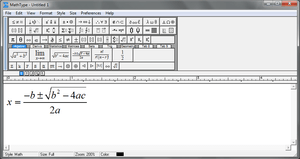MathType
|
| |
|
MathType 6.0 (Windows version) | |
| Developer(s) | Design Science |
|---|---|
| Initial release | June 23, 1987 |
| Stable release | 6.9a / July 28, 2014 |
| Platform | Mac OS X and Microsoft Windows |
| Available in | English, French, German and Japanese |
| Type | Formula editor |
| License | Trialware |
| Website |
www |
MathType is a software application created by Design Science that allows the creation of mathematical notation for inclusion in desktop and web applications.
Features
MathType is a graphical editor for mathematical equations, allowing entry with the mouse or keyboard in a full graphical WYSIWYG environment.[1] This contrasts to document markup languages such as LaTeX where equations are entered as markup in a text editor and then processed into a typeset document as a separate step.
MathType also supports the math markup languages TeX, LaTeX and MathML. LaTeX can be entered directly into MathType,[nb 1] and MathType equations in Microsoft Word can be converted to and from LaTeX.[2] MathType supports copying to and pasting from any of these markup languages.
Additionally, on Windows 7 and later,[3] equations may be drawn using a touch screen or pen (or mouse) via the math input panel.
By default, MathType equations are typeset in Times New Roman, with Symbol used for symbols and Greek. Equations may also be typeset in Euclid, a modern font like Computer Modern used in TeX, and this is included with the software. Roman characters (i.e. variable names and functions) may be typeset in some fonts (the editor is not Unicode compliant).
Support for other applications
Support for other applications is limited to importing image objects into those applications. The equations themselves are not "live."
On Windows, MathType supports object linking and embedding (OLE),[4] which is the standard Windows mechanism for including information from one application in another. In particular office suites such as Microsoft Office and OpenOffice.org for Windows allow MathType equations to be embedded in this way. Equations embedded using OLE are displayed and printed as graphics in the host application, and can be edited later, in which case the host document is updated automatically. In addition, a Microsoft Word add-in is included, which adds features including equation numbering and formatting displayed equations (as opposed to inline equations), which are features that MathType does not add to other applications.
On Macs, there is no analogous standard to OLE so support is not universal. Microsoft Office for Mac supports OLE, so MathType equations may be used there as usual. MathType has support for Apple iWork '09, so equations may be embedded and updated seamlessly in that product too. In applications where no other possibility is available, such as OpenOffice.org for Mac, Design Science recommends exporting equations as images and embedding those images into documents. As on Windows there is a plugin for Microsoft Word for Mac (except for Word 2008[5]), which adds equation formatting features such as equation numbering, which are features that MathType does not add to other applications. AppleWorks included a special version of MathType for built-in equation editing.[6]
For Web applications such as Gmail and Google Docs, MathType supports copying to (and pasting from) HTML <img> tags (created by translating the equation's LaTeX into Google Chart API). There is a list of web application presets in the Copy Preferences dialog, so for example choosing "Google Docs" would copy as an HTML <img> tag, whereas choosing "Wikipedia" would copy as LaTeX wrapped in a <math> wiki tag.
MathDaisy
Design Science also markets the related MathDaisy application, which allows export of MathType to the DAISY digital talking book system, targeted at people with print disabilities.[7] It includes support for the Save As DAISY add-in for Microsoft Word.
Microsoft Equation Editor
Microsoft Equation Editor is a cut-down version of MathType included in Microsoft Office. Although fully functional, it lacks some features of MathType, and it includes a help item with information on purchasing the full product. In previous versions of Microsoft Office it was the default method of inserting and editing equations, but as of more recent versions it has been supplanted by the new equation-editing system (in some applications in Office 2007, and all applications in Office 2010).
Version history
Design Science has released the following versions of MathType
See also
References
- ↑ Design Science: MathType - Equation Editor
- ↑ Design Science: MathType full feature list - Type TeX in Word
- ↑ Design Science: Mathtype - Math Handwriting Recognition
- ↑ Design Science: MathType - Full Feature List - OLE
- ↑ Design Science: What's the story with MathType and Microsoft Office 2008?
- ↑ "AppleWorks 6: Getting Started". p. 2.
- ↑ Design Science: MathDaisy
- ↑ , Design Science, May 4, 1999.
- ↑ , Design Science, October 8, 2001.
- ↑ , Design Science, September 12, 2007.
- ↑ , Design Science, December 2, 2008.
- ↑ , Design Science, December 17, 2009.
Notes
- ↑ This feature is disabled by default, but can be enabled in Workspace Preferences.
Further reading
- Foster, K.R. (December 2001). "Mathtype 5 with mathML for the WWW". IEEE Spectrum 38 (12): 64. doi:10.1109/MSPEC.2001.969610.
